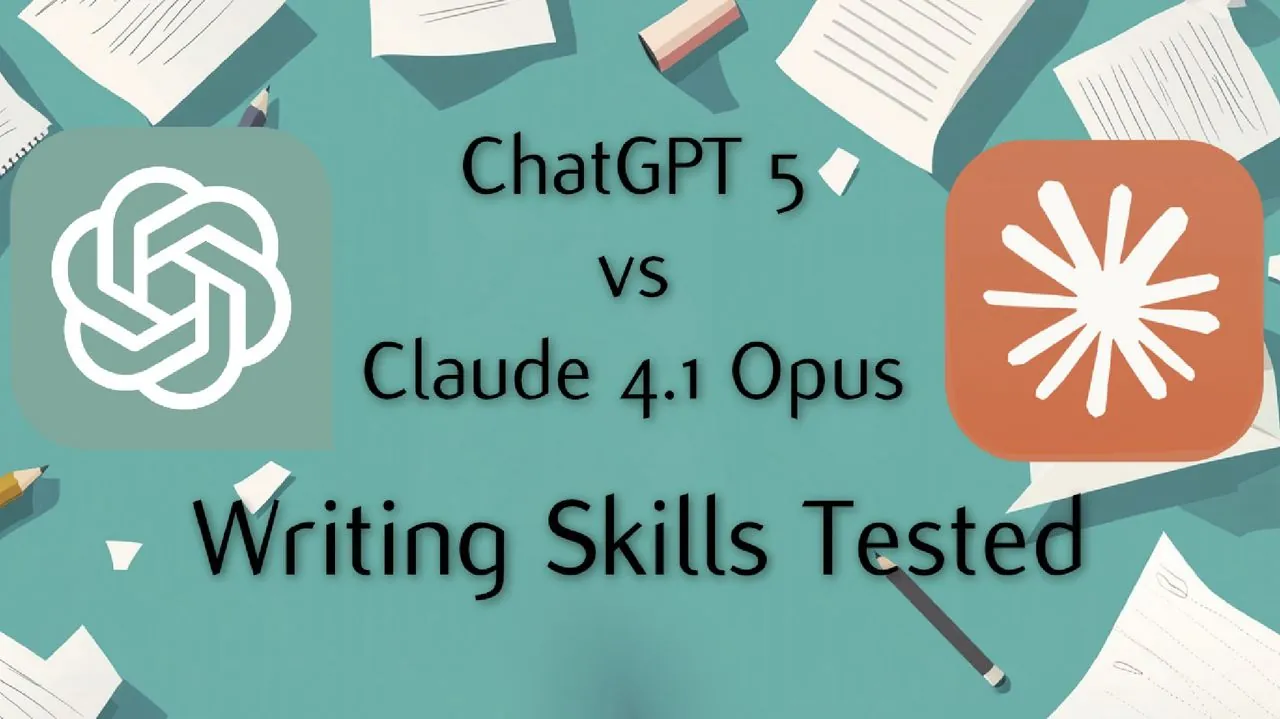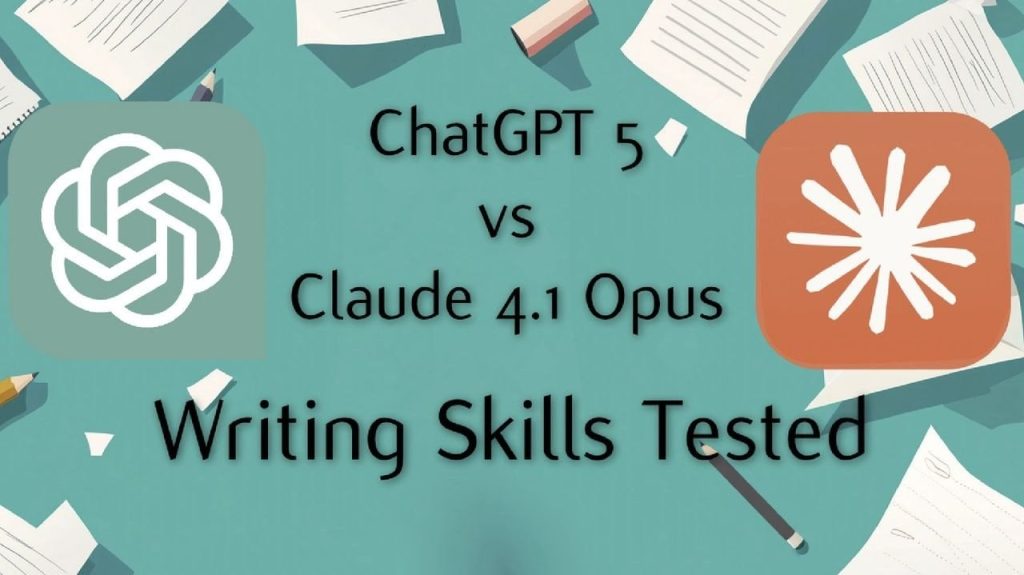
What makes a great AI writing assistant? Is it the ability to craft vivid, imaginative prose that sparks creativity, or the precision to deliver clear, structured content with minimal effort? In the rapidly evolving world of AI, two heavyweights—ChatGPT 5 and Claude 4.1 Opus—have emerged as standout contenders, each with its own distinct strengths. While GPT-5 dazzles with its boundless creativity, Claude 4.1 Opus offers a steady hand for those seeking reliability and clarity. But which one truly excels when it comes to writing skills? This report pits these two advanced models against each other, exploring their unique capabilities and limitations to uncover what sets them apart.
In the following analysis, the Nerdy Novelist takes you hrough how these AI tools compare in areas like writing style, usability, and cost-effectiveness. Whether you’re a content creator craving originality or a professional prioritizing efficiency, this comparison will help you determine which model aligns best with your needs. Along the way, we’ll highlight surprising insights—like why GPT-5’s imaginative brilliance might come at the cost of extra editing, or how Claude 4.1 Opus’s logical consistency could save you hours of work. By the end, you’ll have a clearer understanding of which AI writing assistant deserves a place in your toolkit. After all, the right choice depends not just on what these models can do, but on what you need them to do.
ChatGPT 5 vs Claude 4.1
TL;DR Key Takeaways :
Claude 4.1 Opus excels in producing logical, consistent, and reliable outputs, making it ideal for structured tasks like drafting outlines, articles, or ad copy with minimal editing required.
GPT-5 stands out for its creativity and originality, making it a strong choice for brainstorming, storytelling, and imaginative projects, though it often requires refinement for clarity and precision.
Claude 4.1 Opus is significantly more expensive than GPT-5, making it a premium option for users prioritizing reliability, while GPT-5 offers a more budget-friendly solution for frequent or large-scale use.
Claude 4.1 Opus is user-friendly and requires minimal prompting, while GPT-5 allows for extensive customization and tailored outputs through detailed prompts, appealing to users who enjoy experimenting.
The choice between the two models depends on user priorities: Claude 4.1 Opus is best for precision and efficiency, while GPT-5 is ideal for creative exploration and innovation.
Key Differences at a Glance
Both models excel in different areas, offering unique advantages depending on the task at hand. Here’s a concise breakdown of their key distinctions:
Claude 4.1 Opus: Renowned for its logical, consistent, and reliable outputs, this model is ideal for users seeking straightforward results with minimal effort or editing.
GPT-5: Known for its creativity and originality, GPT-5 produces imaginative and poetic prose. However, it often requires refinement to meet specific requirements or maintain clarity.
Understanding these differences is essential for selecting the right model to suit your goals, whether they involve structured content creation or creative exploration.
Performance and Writing Style
The writing styles of Claude 4.1 Opus and GPT-5 cater to distinct needs, making them suitable for different types of projects.
Claude 4.1 Opus: This model delivers outputs that are clear, logical, and consistent. It is particularly effective for tasks requiring precision, such as drafting outlines, creating structured articles, or generating ad copy. Its reliability minimizes the need for extensive editing, making it a time-efficient choice.
GPT-5: With its emphasis on creativity, GPT-5 excels in brainstorming, storytelling, and world-building. Its ability to produce imaginative content makes it a valuable tool for creative endeavors. However, its poetic tendencies can sometimes lead to abstract or overly complex prose, requiring additional effort to refine.
While Claude 4.1 Opus prioritizes stability and clarity, GPT-5 thrives in scenarios where originality and innovation are paramount.
ChatGPT 5 vs Claude 4.1 Opus Writing Skills Tested
Here are more detailed guides and articles that you may find helpful on AI writing.
Cost Considerations
Budget is a critical factor when choosing between these models, as their pricing structures differ significantly.
Claude 4.1 Opus: This model comes with a premium price tag, costing over seven times as much as GPT-5. While its reliability and precision justify the cost for many users, it may not be accessible for those with limited budgets.
GPT-5: Offering a more affordable solution, GPT-5 is particularly appealing for users who require frequent access to AI writing tools or are working on large-scale projects. Its cost-effectiveness makes it a practical choice for a wide range of applications.
The decision between these models often hinges on balancing the need for reliability with budgetary constraints.
Use Cases and Applications
The suitability of each model depends largely on the specific use case, as their strengths align with different types of tasks.
Claude 4.1 Opus: Best suited for tasks that demand consistency and logical progression, such as drafting articles, creating outlines, or generating ad headlines. Its straightforward approach reduces the need for extensive prompting or editing, making it an efficient choice for structured content creation.
GPT-5: Ideal for creative projects, GPT-5 shines in brainstorming sessions, crafting unique narratives, and generating imaginative content. Users who are willing to invest time in refining prompts and outputs will find its creative potential unmatched.
Both models are effective for generating SEO content, loglines, and outlines, but their strengths cater to different project requirements. Claude 4.1 Opus is a dependable choice for structured tasks, while GPT-5 is better suited for creative exploration.
Prompting and Customization
The effectiveness of both models can be significantly enhanced through proper prompting and customization.
Claude 4.1 Opus: This model requires minimal input to produce coherent and logical outputs. Its simplicity and user-friendly nature make it accessible even for those new to AI tools, allowing for quick and efficient content generation.
GPT-5: Offering greater flexibility, GPT-5 allows for extensive customization through detailed prompts, style guides, or sample texts. While this requires more effort, it enables users to achieve highly tailored results that align with their creative vision.
For users who prefer a hands-off approach, Claude 4.1 Opus is the better choice. Conversely, GPT-5 is ideal for those who enjoy experimenting and fine-tuning their inputs to unlock its full creative potential.
Strengths and Limitations
Each model has its own set of strengths and limitations, making them complementary tools for different types of projects.
Claude 4.1 Opus: Its primary strength lies in its stability and adherence to instructions, making it a reliable choice for structured tasks. However, its higher cost may deter users with tighter budgets.
GPT-5: Known for its creativity and originality, GPT-5 is a powerful tool for imaginative projects. However, its unpredictability and tendency toward abstract prose can make it challenging to use without refinement.
By understanding these strengths and limitations, you can determine which model is best suited to your specific needs and preferences.
Making the Right Choice
Selecting between ChatGPT 5 and Claude 4.1 Opus ultimately depends on your priorities, budget, and willingness to engage in prompt customization.
Claude 4.1 Opus: A dependable option for users who value consistency, logical outputs, and minimal interaction. Its straightforward approach is well-suited for structured tasks that require precision and clarity.
GPT-5: A versatile tool for those who prioritize creativity and originality. While it demands more effort to refine, its imaginative capabilities make it an excellent choice for creative projects.
Both models represent significant advancements in AI writing technology, offering unique strengths that cater to different aspects of the creative process. By carefully evaluating their capabilities and aligning them with your specific goals, you can make an informed decision that maximizes the value of these powerful tools.
Media Credit: The Nerdy Novelist
Filed Under: AI, Top News
Latest Geeky Gadgets Deals
Disclosure: Some of our articles include affiliate links. If you buy something through one of these links, Geeky Gadgets may earn an affiliate commission. Learn about our Disclosure Policy.

